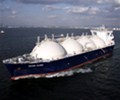France and the UK were the top destinations for US LNG cargoes delivered in May, with Europe maintaining an outsized share of American volumes even as weakening European LNG demand saw prices continue to drop in the region.
Atlantic LNG market participants were closely watching for arbitrage opportunities into Asia, but inter-basin spreads were not yet wide enough to prompt a large shift in the flow of cargoes to major Asian markets. Europe, plus Turkey, received about 71% of the 112 US LNG cargoes delivered in May. That represented a slightly lower percentage than in previous months, but languishing US benchmark Henry Hub natural gas prices and low transportation costs incentivized US volumes to stay in the Atlantic.
France and the UK each received 18 US LNG cargoes during May, followed by the Netherlands with 17, and Argentina and South Korea, each with seven, S&P Global Commodity Insights trade flow data showed.
Platts assessed the FOB Gulf Coast Marker at $6.25/MMBtu on June 1, down 30 cents on the day. This comes after the market reached a two-year low on May 25 at $6.165/MMBtu. The market was last assessed lower on April 14, 2021, at $5.983/MMBtu.
Across the Atlantic, European LNG markets have also softened recently as natural gas storage levels remain high in the region.
The Platts DES Northwest Europe Marker for July was assessed at $6.916/MMBtu on June 1, down 53.4 cents/MMBtu on the day. The market was last seen lower at $6.884/MMBtu on April 23, 2021.
The weakened levels on both sides of the Atlantic Basin come as European stock levels remain well above values seen during the previous year. Gas storage levels in the EU were nearly 69% full as of May 30, or almost 22% above the level seen a year ago, according to Aggregated Gas Storage Inventory data
Response to lower prices
There were signs in May of some LNG markets responding to the lower prices, including the deliveries to Argentina and imports by price-sensitive buyers in South and Southeast Asia. India received three US LNG cargoes in May, after receiving four in April and four in March, while Thailand received one cargo. In the Americas, Brazil, Colombia and Panama each received a single US LNG cargo, and the Dominican Republic received two.
But Europe in May continued to face a lack of competition for US LNG cargoes from buyers in major northeast Asian markets including China, Japan and South Korea, where high gas inventories kept a lid on demand.
The Platts July JKM spot LNG price for delivery into Northeast Asia was assessed at $8.853/MMBtu on June 1, having fallen below $10/MMBtu to reach the lowest level in nearly two years on May 5.
LNG demand in Japan, one of the top overall historical buyers of US LNG, remained weak in May as nuclear restarts and fuel-switching curbed the call on LNG from the country’s power sector. Japan received two US LNG cargoes in May.
China received one US LNG cargo during the month.
In South Korea, the largest overall importer of US LNG since exports began from the Lower 48 in February 2016, LNG sales to power utilities are expected to remain sluggish amid weak demand and higher nuclear power generation.
European LNG imports are expected to remain elevated in 2023 because of the loss of Russian pipeline gas deliveries amid the ongoing war in Ukraine. But the underlying demand weakness is expected to result on a lower call on LNG imports by Europe in 2023 compared with summer 2022, although still high compared to historical norms, S&P Global analysts said in a recent report.
In May, countries that have scrambled to deploy new LNG import infrastructure following Russia’s invasion of Ukraine last year, including Germany, the Netherlands, Italy and Finland, continued to receive US LNG cargoes.
Germany, which now has three operational floating regasification terminals and three more set to be deployed, imported six US LNG cargoes during the month after receiving five cargoes in April. Finland received one US LNG cargo in May, after receiving its first two cargoes LNG in April, both delivered from the US. Italy also received four US LNG cargoes in May.
Source: Hellenic Shipping News






